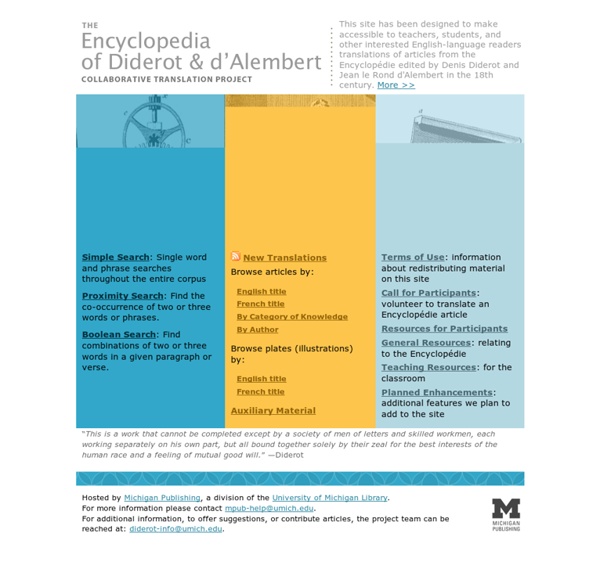



Page d'accueil de la Bibliothèque numérique mondiale LIBRARIES OF FAMOUS MEN If there is one thing the great men of history have in common it’s this: books. They read, a lot. Theodore Roosevelt carried a dozen books with him on his perilous exploration of the River of Doubt (including the Stoics). Lincoln read everything he could get his hands on (often recording passages he liked on spare boards because he didn’t have paper). Napoleon had a library of some 3,500 books with him at St. Helena, and before that had a traveling library he took on campaigns. The point is: Successful people read. Now a lot of the right recommendations are domain specific. These are the books that prepare you for the top, and also warn against its dangers. Biographies How-to & Advice Philosophy & Classical Wisdom Fiction Liber medicina animi — a book is the soul’s medicine. Of course, the books listed here are by no means all you need to be healthy or fulfilled. Enjoy and be careful out there.
L'Encylopedie de Diderot et d'Alembert L'Encylopédie de Diderot et d'Alembert Sans doute l’ouvrage qui a révolutionné le concept du dictionnaire, l’ Encyclopédie ou le dictionnaire raisonné des sciences, des arts et des métiers s’est inscrite dans ce Siècle des lumières comme la preuve absolue de la supériorité de l’homme du savoir sur l’homme de l’église. En acceptant de traduire les deux volumes de la Cyclopedia d’un anglais du nom d’Ephraïm Chambers, Denis Diderot, écrivain et philosophe peu connu, et Jean Le Rond d’Alembert sont bien loin de se douter qu’ils viennent de mettre le doigt dans l’engrenage d’une machine fabuleuse qui occupera une grande partie de leur existence. Diderot se lancera dans de nombreuses polémiques de par ses descriptions qui relèvent davantage du bon sens et de l’observation déductive que d’une tradition religieuse moraliste et superstitieuse. Malgré les scandales et de nombreux débats judiciaires, l’Encyclopédie sera achevée et totalisera 35 volumes.
Encyclopédie sur les oiseaux How To Clean Your Spa/Hot Tub Shell: A Step-by-Step Guide By Olympic Hot Tub’s Valet Team After a dark winter, it can be shocking to see how bad your hot tub looks in the sunlight. If you’ve just “seen it in the light”, take a minute to read the tips from our Valet Team Coordinator, Rob Anderson our Olympic Hot Tub expert on how to clean your hot tub. With his tips, you’ll be able to restore your hot tub to like-new and making your water care regimen easier. The cleaner your shell & pipes are, the better water quality you’ll have on a consistent basis. Have a supply of soft dry towels and elbow grease on hand, grab the products and tools mentioned below and you’re ready to start. Thanks to Rob for these Valet cleaning tips: 1. 2. 3. Other tools that come in handy are a sump pump and a small wet dry vac. 4. 5. 6. 7. If the thought of cleaning your hot tub is too overwhelming or time-consuming for you, why do it yourself? Health through Water, or as the Romans said: Sanum per Aqua. Hot Tub Filters: 10 things You Must Know To Keep Your Hot Tub Water Clean and Safe Unbelievable!
Podcasts de toutes les émissions de la radio France Culture Avec nos partenaires, nous traitons vos données pour les finalités suivantes : le fonctionnement du site, la mesure d'audience et web analyse, la personnalisation, la publicité et le ciblage, les publicités et contenus personnalisés, la mesure de performance des publicités et du contenu, le développement de produit, l'activation des fonctionnalités des réseaux sociaux. Vos préférences seront conservées pendant une durée de 6 mois. A - Encyclopédie médicale Menu Dossier Menu Dossiers Doctissimo Encyclopédie médicale Forums sante Encyclopédie médicale Plus 700 articles encyclopédiques… Véritable puits de science à la portée de tous, notre dico médical vous permettra de mieux comprendre les maladies, les symptômes, les traitements en des termes simples. Ça vous change la vie ! Rester au lit 22140 vues Prévenir les caries14520 vues Opération de la myopie13675 vues Bilan de santé15190 vues Ça vous change la vie ! La newsletter grossesse Je m'abonne La newsletter bébé Je m'abonne > Gérer mes newsletters La chaine Santé de DoctissimoL’herpès labial est-il contagieux ? Toutes les vidéos Santé Rechercher dans nos articles Vos espaces communautaires Tous nos forum : Club Doctissimo - Annuaire des Doctinautes - Chat - Blogs - Albums photos En poursuivant votre navigation sur ce site, vous acceptez que des cookies soient utilisés afin d’améliorer votre expérience d’utilisateur et de vous offrir des contenus personnalisés. J'ai compris
A guide to drawing down your savings in retirement The approach of retirement should be an exciting time for 50- and 60-somethings. But when the issue is your finances — and whether you've saved enough to last the rest of your life — excitement can quickly be overridden by anxiety. One of the first decisions retirees must make is how much of their savings to spend in the first years after leaving full-time work. And unfortunately for people now contemplating retirement, the math on tapping one's nest egg has rarely looked so daunting. It's bad enough that many Americans have saved too little. But even those with substantial savings face the prospect of earning dismally low returns on stocks and bonds for years to come. Worse for savers, hopes have dimmed that the Federal Reserve would aggressively push up short-term bank interest rates this year from near-zero levels. That calls for careful planning both for people already retired and those approaching that red-letter day. •Use the "4% rule" as a benchmark. business@latimes.com
Encyclopédie de L'Agora | huffingtonpost